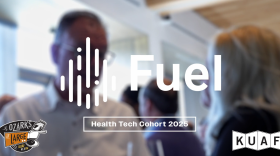Parents of newborns need several things — sleep, for one, but also food for the baby and, of course, diapers. In case you haven’t checked recently, diapers can be a big expense.
A new 12-month pilot project in Northwest Arkansas is designed to help families with diapers while encouraging attendance for well-child visits. The initiative is funded through a grant from the National Diaper Bank Network and is a local partnership between Family Network and Community Clinic.
Community Clinic clients will be offered diapers during newborn, one-month, and two-month well-child visits. Audrey Zavaleta, executive director of Family Network, says the partnership just makes sense since the organizations had partnered in other ways before
“And had seen a similar pilot project in another state where a diaper bank partnered with a healthcare organization to provide diapers at well-child checks. And it’s something that I’ve always just been fascinated by because not only are you helping — not incentivized, but like increasing that attendance at those well-child checks that are so important, those first early checkups — but you’re also providing this super tangible need for families. So it’s kind of a win-win for them.”
The pilot project will work through Family Network’s Diaper Collective. Chris White, outreach and community relations manager for Community Clinic, says they want to meet their clients where they are, both for health matters and day-to-day concerns.
“It’s programs like these that go beyond clinical care, that address real barriers families face. There are a lot of tough decisions that go on in our day-to-day lives, and if we can remove one of those barriers that allows our patients to have one less thing to worry about and access to healthcare, we’re all for it.”
White says it’s widely understood that early well visits for newborns can have immediate and lasting benefits.
“The child and mom, if they are consistently meeting these early appointments, they align with better health outcomes throughout their life. So they’re vitally — they’re very important.”
Audrey Zavaleta, with Family Network, says offering diapers can also have a huge impact. She says about half of American families with young children struggle with diaper need,
“Which means they don’t have enough diapers to get through with their child. And for low-income families, that percentage is even higher. Diapers are super expensive. It can be around $100 a month, maybe even more when it’s a newborn because they’re going through a lot of diapers. Some families are having to make really tough decisions — decisions such as, ‘Do I buy diapers, or do I pay my electric bill? Do I buy diapers, or do I make up the last bit of my rent or gas for my car?’ Families are having to make really tough decisions.”
The Diaper Collective is the only diaper network in Arkansas affiliated with the National Diaper Bank Network. The agency says it distributes more than 60,000 diapers each month to families in need. Community Clinic worked with more than 70,000 clients last year.
Zavaleta says she hopes this year-long launch between the two organizations can extend their services beyond the pilot phase. She says they’re looking for three outcomes from the start, including increased attendance for the early well-child visits.
“But we also want to see a stronger parent and provider relationship — that the parent trusts their healthcare provider and realizes their provider sees them, not only their healthcare needs but also social needs. And then we also just want to relieve caregiver stress. We want to provide some relief to parents. Our hope is that if we can prove some of these outcomes, we’ll be able to get sustained funding in the future so that we can keep doing this and hopefully even expand.”
The first phase will include four Community Clinic locations in Northwest Arkansas, with hopes the partnership will ignite other such collaborations statewide.
Ozarks at Large transcripts are created on a rush deadline. Copy editors utilize AI tools to review work. KUAF does not publish content created by AI. Please reach out to kuafinfo@uark.edu to report an issue. The audio version is the authoritative record of KUAF programming.








